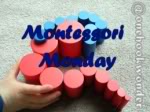
 "At one year of age the child says his first intentional word…his babbling has a purpose, and this intention is a proof of conscious intelligence…He becomes ever more aware that language refers to his surroundings, and his wish to master it consciously becomes also greater….Subconsciously and unaided, he strains himself to learn, and this effort makes his success all the more astonishing." - Maria Montessori(The Absorbent Mind, p. 111)
"At one year of age the child says his first intentional word…his babbling has a purpose, and this intention is a proof of conscious intelligence…He becomes ever more aware that language refers to his surroundings, and his wish to master it consciously becomes also greater….Subconsciously and unaided, he strains himself to learn, and this effort makes his success all the more astonishing." - Maria Montessori(The Absorbent Mind, p. 111)As parents we have an incredible privilege to witness the development of human's intelligence from the first moment of child's life.
Recently I left my work at Montessori Centre to give my all to our two year old girl. We would like to her to grow understanding and speaking three languages: Russian, Spanish and English. This happens quite naturally since Russian is my mother tongue, her dad speaks Spanish and we live in the English speaking country.
For the last three years I have been working with preschool children, however, before that I had an opportunity to work at a multi - age Montessori classroom managed by an American AMI trained director.
When working in the American Montessori Centre in Russia, I recall when children as young as 22 months joined our program without speaking a word of English and within a few months could understand the language and communicate their needs and ideas in English.
I am going to share with you some of the techniques I found very effective working with young children in the Montessori classroom that can be transferred into the home environment and which I successfully practise with my daughter.
1. "At about a year and a half, the child discovers another fact, and that is that each thing has its own name." - Maria Montessori (The Absorbent Mind, p.113)
You probably have noticed that young children are very curious about every new thing that comes their way and grabs their attention. A simple thing like cutting board or whisk can be an object of fascination. Pay attention to those types of new discoveries, and when your child is exploring a new object say it's name very clearly and slowly allowing child to repeat it after you. When presenting child with a new piece of material or object point to it and name it, for example: "tray". Pause and allow the child to repeat after you.
I noticed that sometimes my daughter does not pronounce the first sound of words. In this case I emphasize the first sound: "t-t-t-t-ray" and soon she picks it up.
2. Home walks.
Choose a set of words from the same category, (such as furniture, parts of the house), invite the child to go for a walk around the house, take them by the hand, start pointing to different objects and say them loud and clear. Pause and allow the child to repeat: "table", "chair", sofa", "bookcase", "stool", "bench", "bed", etc. It should be exciting, sweet and short. Five minutes at a time is quite enough.
3. Play phone
Having a phone toy accessible to the child at home is a must. It provides the child the means to develop their language skills in the most natural and engaging way. The child often observes adults having conversation on the phone and happily mimics their behaviour. Pretending speaking on the phone young child starts to pronounce new words and listen very carefully to their own speech.
4. Pictures of realistic objects
Clear, attractive, beautiful and realistic pictures assorted on different categories present the child with opportunity to broaden their vocabulary and help them to become more familiar with the world that surrounds them. Usually pictures are made in pairs for a child to find matching cards or are accompanied by objects or toys.
5. Movement.
"Not only does he create his language, but he shapes the organs that enable him to frame the words. He has to make the physical basis of every moment, all the elements of our intellect, everything the human being is blessed with." Maria Montessori (The Absorbent Mind, p. 22)
As you know a child develops as a whole. Regular exercise improves literacy skills in young child in a great way. Learning to speak and mastering literacy skills goes hand in hand with physical activity and proven to benefit the child's brain development. You can read more about it here. Taking the child on the long nature walks, for example, will provide wide range of opportunities to benefit child's literacy development, strengthen their health and will leave you both with wonderful memories.
I hope you found these suggestions helpful!
Follow Montessori Nature's board Montessori Nature Blog on Pinterest.
linked up here:






.jpg)



No comments:
Post a Comment
What did I miss? Share your thoughts below!